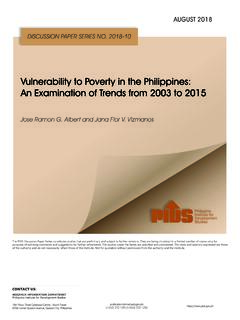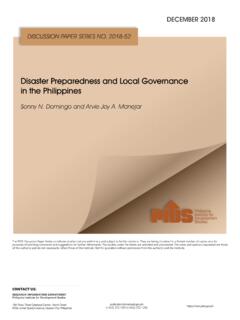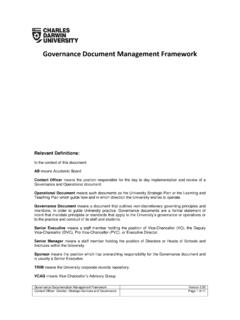Transcription of An Analysis of Regulatory Policies on Solid Waste ...
1 discussion PAPER SERIES NO. 2021-02 JANUARY 2021An Analysis of Regulatory Policies on Solid Waste management in the Philippines: Ways ForwardSonny N. Domingo and Arvie Joy A. ManejarThe PIDS discussion Paper Series constitutes studies that are preliminary and subject to further revisions. They are being circulated in a limited number of copies only for purposes of soliciting comments and suggestions for further refinements. The studies under the Series are unedited and unreviewed. The views and opinions expressed are those of the author(s) and do not necessarily reflect those of the Institute. Not for quotation without permission from the author(s) and the US:RESEARCH INFORMATION DEPARTMENTP hilippine Institute for Development Studies18th Floor, Three Cyberpod Centris - North Tower EDSA corner Quezon Avenue, Quezon City, 8877-4000 An Analysis of Regulatory Policies on Solid Waste management in the Philippines: Ways Forward Sonny N.
2 Domingo Arvie Joy A. Manejar PHILIPPINE INSTITUTE FOR DEVELOPMENT STUDIES January 2021 Abstract Waste management issues have been hounding both urban and rural communities for decades. The passing of Republic Act 9003 or the Ecological Solid Waste management Act of 2000 was meant to ensure the protection of public health and environment, while encouraging resource conservation and recovery, and public cooperation and responsibility. Among its critical provisions were the formal devolution of Waste management to local levels, the forced closure of illegal dumpsites and investment on facilities; and the reduction and proper treatment of Solid wastes. This study looked into the implementation of the law in both national and subnational levels through desk review and the conduct of case studies in selected areas, and the processing of available quantitative data.
3 Results showed varying implementation templates across study sites, reflecting different enabling mechanisms and replicable initiatives. Documented best practices include the legal Waste facility transition of the Payatas dumpsite in Quezon City and the organization of its informal economy; the clustering of Waste management service of Teresa, Rizal and its province-wide incentive mechanism and partnership with construction companies; and the market linkages for revenue generation; and the strong LGU-CSO partnership in San Fernando, Pampanga. The overly simplistic transfer of responsibility to LGUs have largely resulted to two decades of mediocre policy grounding. Common avenues for improvement were also identified including the need to fast-track transition timelines; augment national and local government complementation; invest on appropriate technologies and facilities; and sustain public and private sector engagements.
4 Keywords: Solid Waste management , ecological integrity, sanitary landfill, open dumpsite, material recovery Table of Contents 1. Introduction .. 1 Background of the study .. 1 Objectives .. 1 Policy questions .. 2 Process Evaluation .. 2 Data gathering .. 2 Data Analysis .. 3 2. Global landscape of Solid Waste management .. 4 Waste management and status of systems .. 4 Generation patterns .. 4 3. Policy, institution, finance .. 4 National baseline Policies .. 4 Complementary 5 Institutional organizations .. 6 Local devolution of Waste management .. 7 Local counterparts of institutions .. 8 Fund sources and investment costs .. 9 4. Waste generation and facilities .. 10 Overview of national Waste generation .. 10 Waste facilities in the country .. 18 5. Case studies .. 22 Collection .. 22 Processing .. 22 Disposal.
5 24 Waste management in the time of COVID19 .. 26 Penalties and incentives .. 27 Future initiatives and strategies .. 27 6. Thematic Analysis .. 30 Influence and involvement .. 30 Community engagement, and initiative .. 31 Challenges in implementation .. 31 Streamlining policy .. 33 7. Ways Forward .. 34 8. Conclusion .. 36 9. References .. 39 List of Tables Table 1. Summary of study sites .. 3 Table 2. List of complementary Policies to Ecological Solid Waste management Act of 2000 .. 6 Table 3. Funding sources, priorities, and SWM fund trend across study sites .. 10 Table 4. Average figures for selected Solid Waste management variables disaggregated in categories using ASPBI and CPBI .. 14 Table 5. Waste profile of Quezon City, values in percentage for type and actual values in units for category .. 15 Table 6. Wastes (kg/capita/day) diverted from major locations, disaggregated by material and collector.
6 23 List of Figures Figure 1. Conceptual framework, a cyclical illustration of Gamaralalage, Gilby, & Lee study .. 3 Figure 2. Solid Waste management options based on RA 9003 .. 5 Figure 3. Sources, composition, and projected volume generation of SWM in the Philippines .. 11 Figure 4. Labels with highest average share of generated Waste across WABA communities .. 12 Figure 5. Average Waste generated by source and by type in Bulacan and Pampanga .. 17 Figure 6. Daily Waste in generation across cities and municipalities of Bulacan and Pampanga .. 17 Figure 7. Legal transition from open dumpsite to engineered sanitary landfill .. 19 Figure 8. Trend of material recovery facility across regions from 2008-2015 .. 20 Figure 9. Solid Waste management facilities in Metro Manila, Rizal, Bulacan, and Pampanga .. 21 Figure 10. Waste volume disposed to MSWMC and tipping expenses of Pampanga LGUs for 2017 and 2018.
7 25 Figure 11. Summary of disposal conditions across study sites .. 26 1 An Analysis of Regulatory Policies on Solid Waste management in the Philippines: Ways forward Sonny N. Domingo and Arvie Joy A. Manejar1 1. Introduction Background of the study Waste generation is heavily linked by literature with urbanization, economic development, and population growth. Its increasing rates are believed to be driven by rapid urbanization, lifestyle changes, and consumption patterns, resulting inevitably to the rise of greenhouse gases emissions (Gamaralalage, Gilby, & Lee 2015; Kaza et al. 2018). The recorded figure for the world s daily Waste generation was around 39,422 tonnes in 2015, but this was expected to double by 2025 (EMB 2015 and World Bank 2012). If left unmitigated, these may lead to a compounding of problems involving leachate intrusion in water tables, shifts in climate patterns, and more exposure to disaster risks.
8 The global Solid Waste management concern is similarly mirrored in the Philippines, with even more dire forecasts in certain aspects given the complexities within a developing economy. To address the growing amount of generated wastes and to put in place Regulatory mechanisms, the country issued its umbrella Waste management policy in 2001 through the Republic Act No. 9003, otherwise known as the Ecological Solid Waste management Act. This legislation, in complementation with the RA 7160 or the Local Government Code, mandates local government units to serve as lead implementor and establishes the blueprint for national and subnational plans and initiatives on Waste management . The frontline primacy of LGUs is recognized, with even global counterparts revealing apparent focus on municipal Solid Waste management , involving components on Waste generation, collection and disposal (Themeleis 2003 and Dong et al.)
9 2003). This study revisited the state of Waste management in the country and looked into four representative case study sites, two decades after the passing of RA 9003. It assessed evidences of grounded provisions vis- -vis the objectives of the policy, observed distinct mechanisms and arrangements across LGUs, identified policy lapses and probed possible ways forward in the Regulatory landscape. Objectives The study generally aimed to conduct a process evaluation of the implementation of the Ecological Solid Waste management Act of 2000 (RA 9003). Specifically, the study aimed to: a. Review the provisions and grounding of the Ecological Solid Waste management Act of 2000 (RA 9003), and related Policies ; b. Conduct case studies on local government implementation of RA 9003, identify best practices, and describe the transition of Regulatory Policies as provided for by the law; c.
10 Recommend ways forward to augment policy and facilitate implementation. 1 Senior Research Fellow and Research Analyst II respectively, at the Philippine Institute for Development Studies 2 Policy questions The Ecological Solid Waste management Act has been passed into law early in 2001, serving as the country s main thematic policy anchor for two decades now. As the implementation of RA 9003 was largely devolved to the local governments, it is important to assess the process of grounding provisions particularly at the subnational level, across issues related to mandate execution, resource conservation and recovery, public and private sector participation, facility augmentation, and environmental protection awareness and action. This study sought to answer the following policy questions: What issues predominate in local government grounding of the Solid Waste management act and related policy?












